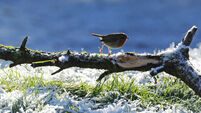'Expect things not to be perfect': the Christmas survival guide

Picture: iStock
We ask a lot of Christmas. It comes at the mid-point of winter when the days are at their shortest, the light at its lowest – and we pile it high with expectations and demand it deliver.
We expect perfection like in the festive TV ads that paint Christmas in rosy tints – everyone gathered around a table laden with gorgeous food, everything warm and cosy, everyone in a good place and getting along.











